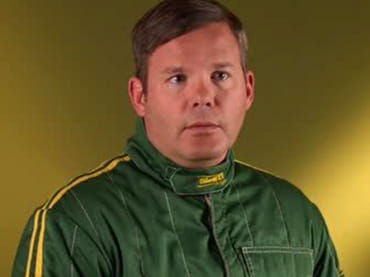The Challenge: Fogginess, Headaches, Vertigo, and More
Daren enjoys restoring and racing vintage cards. But during a race through Oakland in July 2014, his car spun into a telephone pole.
The crash left him with four broken ribs and, later, concussion symptoms of:
- Fogginess
- Headaches
- Vision troubles
- Vertigo
- Mood changes
"Luckily, it was a single car accident — just myself. The car hit the ground, spun, I ended up hitting a pole, and it split the car in half. I hit hard enough to pull the seatbelt out of the chassis. It knocked me unconscious," Daren recalls.
Daren's wife, Holly, describes her husband as, “a strong type-A personality. There's no stopping him when he has his mind made up."
Although Daren reported feeling normal, it soon became clear to Holly that something wasn't right.
“Daren's symptoms were cognitive. He had headaches. He seemed as if he was in a fog at times, and he had a delayed response time," Holly says.
Daren's Path to the UPMC Sports Medicine Concussion Program
At the time of Daren's accident, his nephew — a football player — was receiving treatment at the UPMC Sports Medicine Concussion Program. Aware of Daren's symptoms, his sister-in-law suggested he make a visit as well.
Less than a week after his wreck, Holly and Daren went to see Micky Collins, PhD, and the concussion team.
"The impression of the UPMC Sports Medicine facility was very professional," Daren says. "The first thing is they asked questions and just listened to what you were telling them. They wanted to know what you're going through and what happened."
The doctors helped Daren learn what it meant to have a concussion. And they explained why he needed to follow an active treatment program to recover.
"First thing, they asked questions and just listened to what I was telling them. They want to understand what you're going through, what happened, and they listen." — Daren
The Solution: Balancing Exertion and Relaxation
Daren learned his path to recovery would involve physical therapy, vision therapy, and half-days at work. His vision troubles and vertigo made it hard to work a full day.So, exercises to make daily tasks — like looking at a computer screen — easier, were part of his rehab.
“Daren went on to do physical therapy and take medicine to help with his symptoms. The care team also instructed him to relax, which isn't easy for someone like him who is always on the go," Holly recalls.
"I'm probably the worst patient you could ever have. All I want to do is go from 0 to 100," Daren shares. "I don't want to focus on one thing. I want to try and do a bunch of things at the same time. So, to get Dr. Collins to clear me, he wanted to hear from my wife. To talk to her, to make sure she felt that I was where I needed to be to go racing."
Daren devoted himself to his rehab plan.
During his treatment, Holly played a supportive role by confirming his health descriptions with his doctors.
The Results: Back to Work and the Racetrack
At his last appointment, Dr. Collins cleared Daren to return to racing. Soon after, Daren started getting his car ready for future races.
His commitment, honesty with the care team, and knowledge he gained about concussion helped him return to full-time work in October 2014.
Both Daren and Holly learned a great deal about concussion from the experts at UPMC.
“Before the accident, both of us were completely naïve to concussion and its symptoms, as well as the short- and long-term impacts. It was really eye-opening for us and a huge learning experience. Everyone at the facility gave us the great input and support we needed to get through this time," Holly shares.
"The doctors here at Pittsburgh are amazing. I'll be the first to admit I didn't know what a concussion really meant. They were able to explain to me and show me what my concussion was. And they helped me understand what I needed to do to get better," says Daren.
"My entire life is about getting into old vintage cars and racing. It's what my hobby is. So, I was very happy when Dr. Collins said I could get back into a car," says Daren.

















